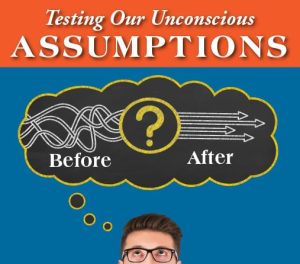 I have been doing more thinking about what it is that motivates a buyer’s purchasing choices — how it’s driven by emotion and justified with logic, as I noted in another article.
I have been doing more thinking about what it is that motivates a buyer’s purchasing choices — how it’s driven by emotion and justified with logic, as I noted in another article.
As a window into how people make any kind of choice, this makes total sense, but there’s a hidden aspect: These emotions are often driven by unconscious assumptions.
During the process of learning about my clients’ target customers, I have noticed that many clients work from assumptions that they have neither tested nor questioned, and that they may not even realize they have. Example: “Everybody is on Facebook, so I need to advertise on Facebook.”
Oh, Really?
If we can make an assumption like this conscious, we can analyze it. “So what is that based on? My own use of Facebook? How often do I click through and actually buy something? Do I know whether that is common behavior among my markets? How do I know that?”
This kind of exploration can lead to a conversation that uncovers what the client’s market actually pays attention to, creating a much greater chance of success than throwing resources down an assumption rabbit hole.
We All Do It
Acting on unconscious assumptions is something all humans do, and it frequently plays out in marketing, both in the seller and in the buyer. The challenge is to understand ourselves well enough to learn how our unexamined ideas may affect our marketing approach. When we combine this understanding with identifying the target market’s unconscious assumptions, we can design a more effective marketing strategy.
Some Examples
Here are some examples of assumptions that are often unconscious:
- I love ________, so that means EVERYBODY ELSE loves it too.
- No one cares about ________ because I don’t.
- If I run an ad on Wednesday and I don’t sell out on Thursday, the ad was a waste.
- Person X is too old to understand ________. (Put anything digital here.)
- Generation Whoever is too young to understand _______. (Because people younger than ourselves are, you know, lazy/entitled/whine a lot/etc.)
Oops
When assumptions are unconscious, they can morph into beliefs. When that happens, they become harder to correct because we are more emotionally invested in holding onto them. I have noticed this in myself — it is not easy to practice self-awareness at this level.
Another Take
Here’s a take on that from one of my favorite blogs, Digital Tonto:
Beliefs are amazing things. We don’t need any evidence or rational basis to believe something to be true. In fact, research has shown that, when confronted with scientific evidence which conflicts with preexisting views, people tend to question the objectivity of the research rather than revisit their beliefs.
Whoa.
Making Your Case
In order to make your case for the value of your product or service, spend time actively searching for and testing any assumptions that could get in the way of seeing your target market more clearly. Dealing with assumptions right from the beginning helps ensure they will not blindside you later.
Like everyone else, I have my blind spots and it is always valuable for me to enlist a perceptive sounding board to help find them. It is another demonstration of the saying “all of us are smarter than one of us.”
If you would like help uncovering erroneous assumptions or beliefs that are getting in the way of a successful marketing approach, I‘m here for you!
